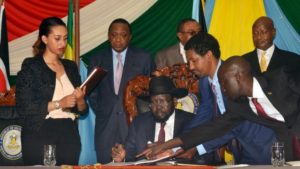Jewish World Watch welcomes the signing of a peace deal that is set to end the violent civil war that has plagued South Sudan since December 2013. Though President Salva Kiir initially stalled, now the two warring factions have endorsed the agreement. However, we remain cautious: both sides have expressed reservations about the deal, and their track record of signing and subsequently violating previous cessation of hostility agreements is very concerning. Additionally, as some of the opposition commanders have broken away from Machar’s leadership, there is a good chance that fighting will not stop.
We hope that the two leaders, President Salva Kiir and former Vice President Riek Machar, and any splinter factions will decide that the time for peace is now and begin to put their country on the path towards healing, reconciliation, accountability, and unity.
The international community, through the leadership of IGAD, regional heads of state, and the United States, must not turn away and become complacent. The tenuous peace agreement must be monitored closely to ensure that fighting does in fact stop, foreign forces leave the country, and all steps are appropriately taken to create the Transitional Government of National United (TGoNU) in 90 days. If fighting does continue, coercive measures such as targeted sanctions and an arms embargo should be swiftly implemented.
If the deal holds and peace is reached, South Sudan will face new challenges as it moves to adopt the “Agreement on the Resolution of the Conflict in the Republic of South Sudan.” In order to fully address the situation and put the country on a path towards sustainable peace, the following must be undertaken:
- Create a Transitional Government that will lead the country for the next two and a half years;
- Invest in real security sector reform (SSR) that will not only work on comprehensive disarmament, demobilization, and reintegration (DDR) strategies, but also build reconciliation and cohesion among members of the security forces;
- Develop a comprehensive plan to address the small arms problem that permeates South Sudan;
- Establish a hybrid court with independent investigators to ensure that the worst perpetrators of human rights violations are held responsible;
- Conduct investigations into the corruption and pilfering of natural resource wealth that is bankrupting the future of the country;
- Commit to and invest in healing and reconciliation throughout the whole country, not just the conflict-affected regions, and address long-standing ethnic rivalries and cultural practices (e.g. cattle raiding) that divide communities;
- Ensure that there is widespread civil society engagement that will make the voice of the people heard as the entire peace process has been less than inclusive; and
- Develop a plan to consult with civil society on the creation of a new constitution.


